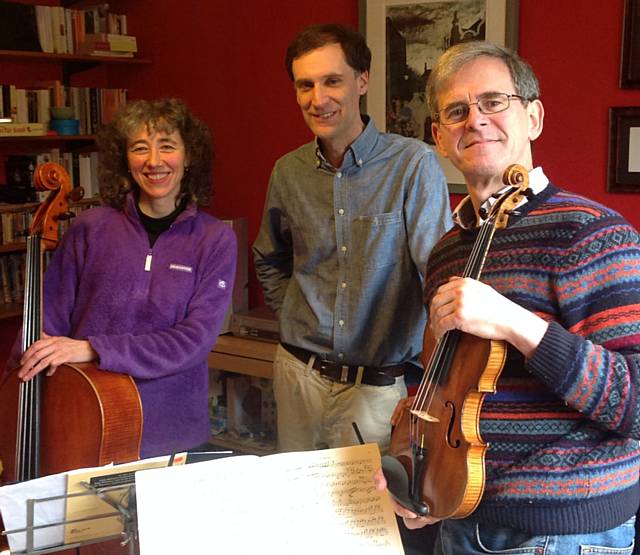Erringden Piano Trio - Rochdale Music Society Concert
Date published: 13 May 2014

Erringden Piano Trio
Paul Barritt (vioilin), Helen Thatcher (cello) and Darius Batiwalla (piano) came together as the Erringden Piano Trio with an attractive programme of classical and late romantic music elegantly executed to the delight of a most appreciative audience in the Heywood Civic Centre.
The concert began with Beethoven’s Trio in E flat Op.1 No.1, an early work - first performed in 1793 - in which the composer revealed the craftsmanship he had learned from predecessors Haydn and Mozart but established the immense scope of his own personality as it began to tower over theirs and others at the height of the so-called ‘Classical’ period. As the first item in a concert it was presented in masterly fashion. Recognising its power to alert an audience to the attraction of clearly structured musical expression, members of the Trio quickly established their credentials as the accomplished musicians they are, each making a seemingly effortless contribution to the delightful musical discussion that is going on throughout the four movements.
The other work in the first half was Frank Bridge’s Phantasy Trio in C minor. Written in 1907 and structured like on old English Fancy or Fantasia - a single movement with several contrasting sections - this passionate work reveals the influence of Fauré and French impressionism. The players accepted whole-heartedly Bridge’s call to boldly go where no English composer had gone before, and enter a world of intense feeling opened up by the flamboyant gesture with which the music begins. Going on to reveal its wealth of rhythmic, melodic and harmonic riches, the audience was carried along on a musical journey through the ever-changing, often challenging but always fascinating landscapes of life. We could have been forgiven for thinking that we were hearing echoes of later composers’ (continental or American) melodic turns of phrase, harmonic twists or rhythmic emphases and quirks, and had to remember that they were to be heard here first. Bridge’s music deserves much more attention than is given to it by concert promoters.
The concert’s second half began with the Elegy by Jospeh Suk. Written in 1902, originally for the unusual combination of violin, cello, string quartet, harmonium and harp, this intensely appealing music was inspired by one of the poet Julius Zeyer’s nostalgic, patriotic odes about the Vyseradu (the ancient fort of kings) in Prague, and is typical of the national angst - a kind of atavistic yearning - that characterises much of Suk’s music. It gave the string players the opportunity to indulge in sustained and impassioned melodies, which they did with great warmth and depth of tone, while the pianist provided the discreet and/or urgent encouragement Suk thought appropriate.
The final item in the concert was Mendelssohn’s Piano Trio in D minor of 1839. Its four movements give each player ample opportunity to display artistic accomplishment as well as technical prowess. Rising to the occasion and showing great depth of insight, each player more than amply rewarded the composer’s intentions by contributing richly to the musical flow. The cello presented the warm, lyrical themes that set the first movement’s dialogue in motion. The violin provided a suitably warm counter-melody when the main theme returned. The pianist set the slow movement’s pace with a tangible sense of delight in the main song-without-words melody. This was taken up by the others and elaborated on as the music became more and more impassioned, before the pianist was left to affirm the first melodic strain to the mysterious accompaniment of the strings played in what amounts to a tremolo fashion. All beautifully judged.
The short, light third movement was executed with the rare delicacy that only such accomplished musicians can bring to this Midsummer Night’s Dream-like score.
The finale kept the pianist very busy - in bravura fashion times - and called for all the resourcefulness of the string players in making melody sing and rhythm count. The wealth of experience of all three musicians was evident in the way they worked together to keep the music driving forward inexorably towards its final, triumphant flourish.
Rochdale Music Society is to be congratulated for bringing such music and musicians to the Borough in these times when live music-making of this kind and at this level is all too often discounted by a public fed on the reproduction sounds of studio recordings or the modulated sounds of radio and television broadcasts.
Do you have a story for us?
Let us know by emailing news@rochdaleonline.co.uk
All contact will be treated in confidence.
Most Viewed News Stories
- 1Schools in Rochdale borough to become vape free settings
- 2Historic England ‘disappointed’ by the spat over Hopwood Hall
- 3Consequences of impending landline switch off revealed in new survey
- 4Sports club music festival to go ahead despite neighbours’ fears
- 5Police officer from Rochdale sentenced for sexually assaulting colleagues
To contact the Rochdale Online news desk, email news@rochdaleonline.co.uk or visit our news submission page.
To get the latest news on your desktop or mobile, follow Rochdale Online on Twitter and Facebook.

